Play helps children to feel safe and secure in new environments which contributes to successful transitions.

Download the Transition and the Importance of Play printable resource
Curriculum
Early Years Learning Framework (ELYF)
- Children have a strong sense of identity
- Children are connected with and contribute to their world
- Children have a strong sense of wellbeing
- Children are confident and involved learners
- Children are effective communicators.
- Communicates effectively by using interpersonal conventions and language with familiar peers and adults. (ENE-OLC-01)
- Understands and responds to literature read to them. (ENE-UARL-01)
- Demonstrates an understanding of how whole numbers indicate quantity. (MAE-RWN-01)
- Reads numerals and represents whole numbers at least to 20. (MAE-RWN-02)
- Communicates ways to be caring, inclusive and respectful of others. (PDe-3)
Families
Read (2 mins)

Play is important to a successful transition.
Play helps children feel safe and is an aspect of school transition that gives children the opportunity to develop the social skills needed for school success.
Being able to choose what to play and who to play with, develops personal responsibility, and gives children time to practise and consolidate their skills in working with others.
Through play children learn to:
- emotionally regulate
- be creative
- be resilient
- cooperate
- collaborate
- solve problems
- develop their language, social skills and communication.
Play encourages children to:
- move more
- develop physical skills
- increase their confidence.
Through familiar activities, children are able to develop and harness critical skills that are foundational in fostering their confidence making for successful transitions.
Explore (10 mins)

Some ideas for learning in the everyday:
- Reading, writing and telling stories
- Playing with other children
- Making mistakes, fighting with other children and having help to resolve differences and making up
- Taking responsibility for household chores
- Choosing their preference from a range of healthy food options
- Increasing responsibility for themselves and their belongings
- Taking part in art and crafts
- Spending time outside and at the playground
- Finding and having a chance to practise new physical challenges
- Learning ways to cope with tricky feelings
- Feeling safe to fail and try again.
Teachers
Reflect (30 mins)

Reflect on your knowledge and practice. Consider the EYLF, NSW Syllabus and LPs:
- Where have these children come from?
- Where are you taking them?
Think about the learning happens in your classroom that builds the knowledge and skills for a successful transition to the classroom.
What do you expect from the early learner?
What do you want parents to know about transition?
In what other settings might a child experience transition? (i.e. not just from an ELC to K classroom)
How will you use transition to know more about a child’s social readiness for school?
This is an opportunity to share how you use play in successful transitions in your classroom.
Engage (45 mins)

Engage in a learning conversation with parents. Suggested conversation starters:
- Is there anything in the video that challenged your thinking about learning and the connection with transition?
- What foundational skills do you see in the video that would assist with a successful transition?
- How are the children:
- Practising their skills?
- Testing their ideas?
- Building their knowledge?
- What opportunity can you create, or do you have at home that supports your child’s transition journey?